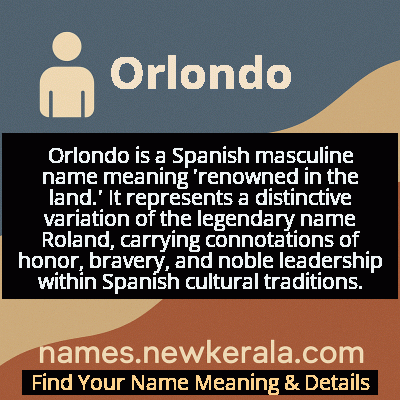Orlondo Name Meaning & Details
Origin, Popularity, Numerology Analysis & Name Meaning of Orlondo
Discover the origin, meaning, and cultural significance of the name ORLONDO. Delve into its historical roots and explore the lasting impact it has had on communities and traditions.
Name
Orlondo
Gender
Male
Origin
Spanish
Lucky Number
3
Meaning of the Name - Orlondo
Orlondo is a Spanish masculine name meaning 'renowned in the land.' It represents a distinctive variation of the legendary name Roland, carrying connotations of honor, bravery, and noble leadership within Spanish cultural traditions.
Orlondo - Complete Numerology Analysis
Your Numerology Number
Based on Pythagorean Numerology System
Ruling Planet
Jupiter
Positive Nature
Optimistic, inspirational, and creative.
Negative Traits
Scattered, exaggerating.
Lucky Colours
Yellow, gold, purple.
Lucky Days
Thursday.
Lucky Stones
Yellow sapphire.
Harmony Numbers
1, 2, 9.
Best Suited Professions
Arts, writing, communication.
What People Like About You
Creativity, optimism.
Famous People Named Orlondo
Orlondo Steinauer
Football Coach
Head coach of the Hamilton Tiger-Cats in the CFL, known for his defensive expertise and leadership
Orlondo Paz
Musician
Latin American guitarist and composer known for blending traditional Spanish music with modern influences
Orlondo Thomas
Educator
Renowned Spanish language professor and author of several influential language textbooks
Name Variations & International Equivalents
Click on blue names to explore their detailed meanings. Gray names with will be available soon.
Cultural & Historical Significance
The cultural significance of Orlondo extends beyond its literary origins to represent a connection to Spanish heritage and the values of honor, family loyalty, and community protection. In modern contexts, the name often signifies parents' desire to bestow upon their child a name with historical depth and moral weight, while maintaining a distinctive sound that sets it apart from more conventional choices. The name's persistence in Spanish-speaking communities demonstrates how medieval European legends were adapted and personalized within Hispanic naming traditions, creating a unique cultural synthesis that continues to resonate with contemporary families seeking meaningful names with historical roots.
Extended Personality Analysis
Individuals named Orlondo are often perceived as possessing strong leadership qualities, natural charisma, and a deep sense of honor inherited from the name's heroic origins. They tend to be ambitious yet principled, combining strategic thinking with emotional intelligence that allows them to navigate complex social situations effectively. The name suggests someone who is both reliable and innovative, capable of upholding traditional values while embracing progressive ideas. Orlondos are typically seen as protective of their loved ones and communities, often taking on roles that require both strength and sensitivity, reflecting the chivalric ideals associated with their namesake.
Their personality often reflects the name's heroic origins through a quiet confidence rather than overt bravado, making them respected figures in both personal and professional spheres. They tend to excel in positions that require both independent decision-making and collaborative leadership, balancing determination with empathy in their approach to challenges. The combination of traditional values and modern adaptability makes Orlondos particularly effective in bridging generational or cultural divides, often serving as mediators or visionaries who can honor the past while building for the future. Their inherent sense of responsibility and natural authority frequently leads them to leadership positions where they can make meaningful contributions to their communities or organizations.
Modern Usage & Popularity
In contemporary times, Orlondo maintains a niche but respected presence in Spanish-speaking communities, particularly among families seeking traditional names with unique character. The name has experienced modest but steady usage, appealing to parents who want to honor cultural heritage while choosing a distinctive name that stands out from more common Spanish names. Its popularity remains highest in Spain and certain Latin American countries with strong connections to medieval history and literature. Recent trends show a slight resurgence as younger generations rediscover historical names with strong meanings, though it remains far less common than its variants Orlando or Rolando. The name's association with sports figures and cultural ambassadors has helped maintain its visibility and positive connotations in modern contexts.
Symbolic & Spiritual Meanings
Symbolically, Orlondo represents the ideal of honorable leadership and enduring legacy, drawing from its association with the legendary Roland who embodied chivalric virtues. The name carries deep connotations of protection, moral integrity, and courageous action in service of higher principles. It suggests an individual destined to make significant contributions to their community or field while maintaining strong ethical foundations. Metaphorically, Orlondo symbolizes the bridge between historical tradition and contemporary relevance, representing someone who respects and learns from the past while actively shaping the future. The name also embodies the concept of loyal companionship and reliable partnership, reflecting the legendary friendship between Roland and Oliver in medieval literature.

